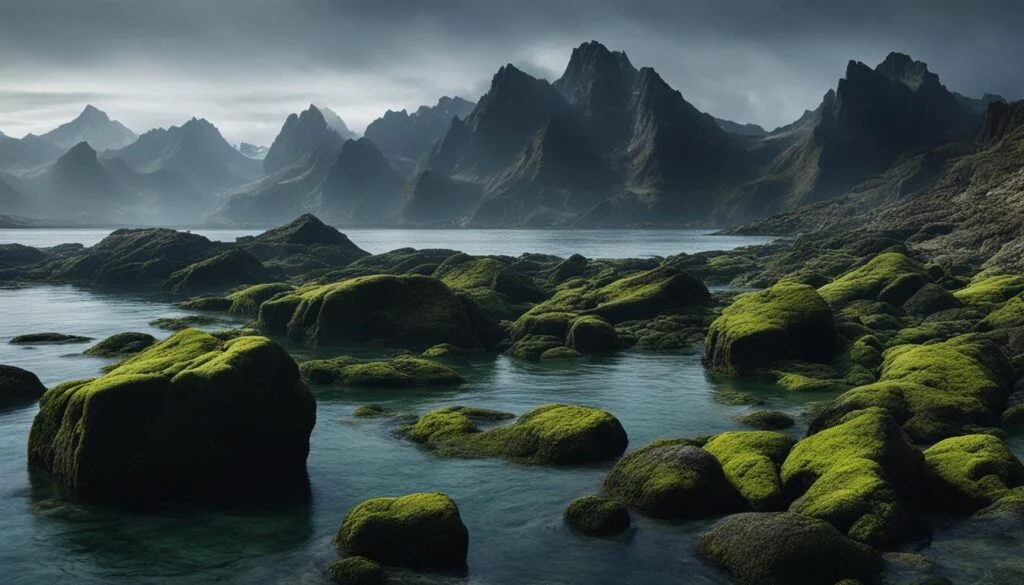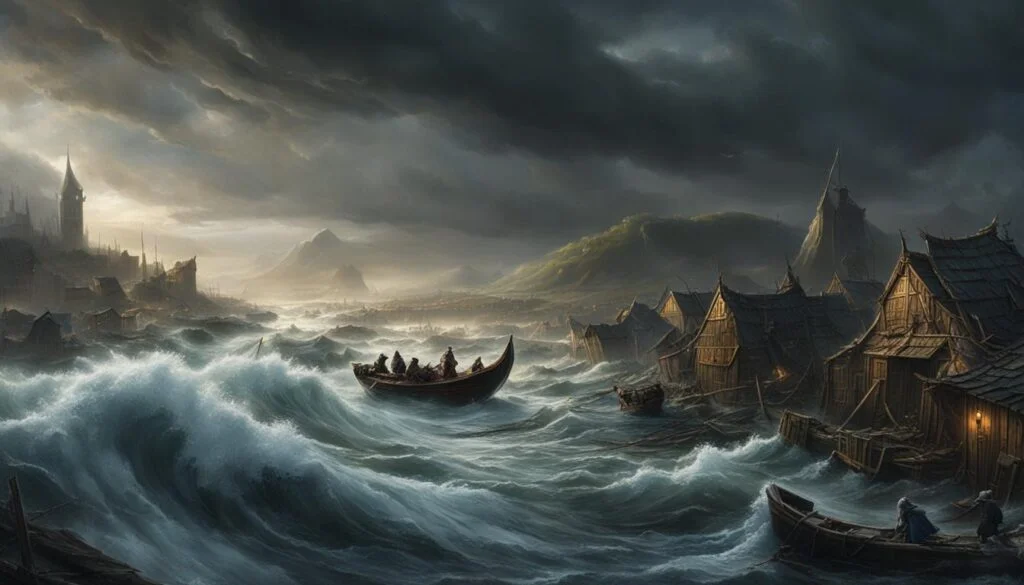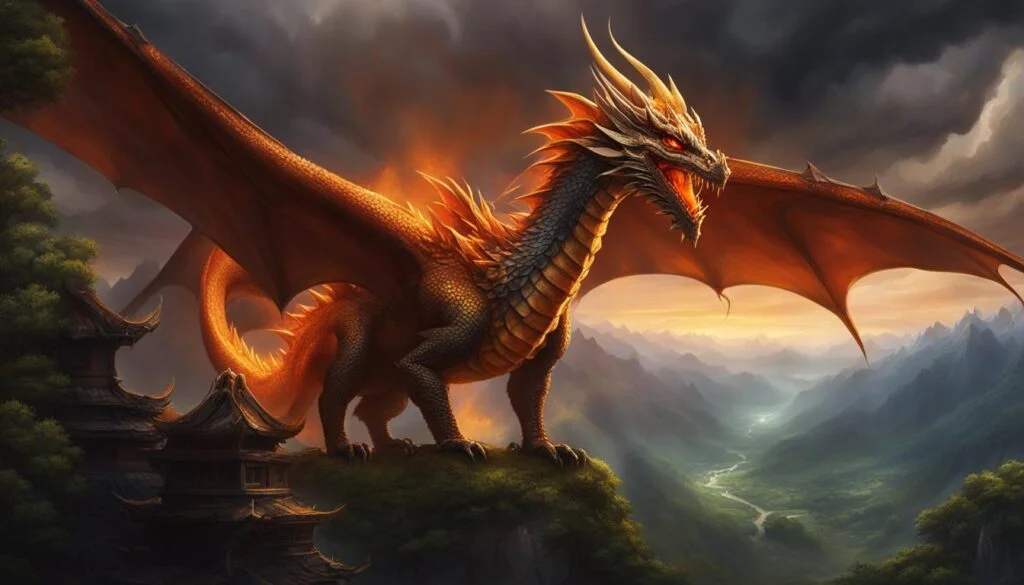Norse mythology is known for its rich and intricate stories. From epic battles to fantastical creatures, Norse culture has captured the imaginations of people for centuries. But amidst all the tales of gods and heroes, does Norse mythology include a flood myth, similar to the ones found in many other cultures? Let’s delve into the origins and potential impact of a flood myth in Norse culture, and explore any connections it may have to flood stories from around the world.
Key Takeaways:
- Despite the absence of a direct and explicit flood myth in Norse mythology, there are elements within Norse culture and mythology that could be connected to flood legends.
- The concept of Ragnarok, the end of the world in Norse mythology, includes a cataclysmic event that leads to the flooding of the earth.
- The story of the creation of the world in Norse mythology involves the primordial giant Ymir being killed and his blood flooding the world.
- While there is limited scientific evidence to support the existence of a specific flood myth in Norse mythology, geomythology suggests that flood myths may arise from geological phenomena.
- The presence of flooding and water-related events in Norse mythology raises the possibility of a symbolic representation of a flood myth within the larger framework of Norse mythology.
Flood Myths in Other Cultures
Flood stories are a common theme in many religions and cultures worldwide. From the Judeo-Christian story of Noah’s Ark to the ancient Mesopotamian Epic of Gilgamesh, various cultures have their own versions of a great flood that destroys the world and is survived by a chosen few.
These flood myths often share similarities in their narratives. They typically involve an angry deity or deities who bring about the flood as a punishment or a cleansing of the earth. The chosen few are often warned in advance and instructed to build an ark or boat to survive the impending deluge. After the floodwaters recede, these survivor(s) repopulate the earth. Although the details may vary, these core elements can be found in flood myths around the world.
For example, in Hindu mythology, the god Vishnu takes the form of a fish to save Manu, the progenitor of humanity, from a great flood. In Native American legends, the Hopi people believe in the existence of previous worlds, each of which was destroyed by a flood, with the survivors starting anew.
It’s intriguing to see how flood myths transcend cultural boundaries and are ingrained in the collective consciousness of humanity. The shared themes and motifs in these flood stories suggest a common human fascination with catastrophic events and the resilience and hope inherent in survival.
Norse Mythology and Flood Legends

While there is no direct evidence of a flood myth in Norse mythology, some scholars believe that certain elements of Norse culture and mythology may be connected to flood legends. The concept of Ragnarok, the end of the world in Norse mythology, includes a cataclysmic event that leads to the flooding of the earth. Additionally, the story of the creation of the world in Norse mythology involves the primordial giant Ymir being killed and his blood flooding the world. These narratives could be seen as symbolic representations of a flood myth within the larger framework of Norse mythology.
Geological Evidence and Interpretation

While Norse mythology is rich in tales of flooding and water-related events, determining whether these narratives are evidence of a specific flood myth requires a scientific lens. Geomythology, the study of how myths and geology intersect, offers insights into the potential origins of flood myths.
Geologists hypothesize that flood myths may have originated from real geological events such as volcanic eruptions, earthquakes, or changes in sea levels. These natural phenomena can cause catastrophic flooding, leading to the preservation of these events in cultural narratives.
However, when it comes to Norse mythology, the geological evidence supporting a distinct flood myth is limited. While there are references to flooding and water-related events, connecting them directly to a specific flood myth can be challenging due to the symbolic nature of Norse mythology.
Geomythology and Norse Flood Stories
Geomythology offers a valuable perspective on the potential connections between Norse flood stories and geological events. By analyzing the geological context of these narratives, researchers can shed light on the cultural significance of flooding and its portrayal in Norse mythology.
However, it is essential to approach the interpretation of Norse flood stories with caution, as these narratives often carry symbolic and metaphorical meanings. While geological evidence can provide insights into the possibility of real-world events inspiring some elements of these stories, it does not definitively prove the existence of a distinct flood myth in Norse mythology.
Scientific Analysis of Norse Mythology Flood
Scientific analysis of Norse mythology’s flood-related narratives involves examining geological features, historical records, and cross-cultural comparisons. This multidisciplinary approach allows researchers to investigate possible correlations and connections between the stories and actual geological events in the Norse region.
Through scientific analysis, scholars can draw parallels between Norse flood stories and geological events that may have occurred in the past. However, it is important to remember that these correlations are speculative and require further research and evidence to establish a definitive link between Norse mythology and geological phenomena.
A Complex Relationship
The relationship between Norse mythology and geological events is intricate, blending cultural symbolism, storytelling, and potential real-world occurrences. While geological evidence can provide valuable insights, it is essential to approach the interpretation of Norse flood stories with a nuanced understanding of their cultural and mythological contexts.
Conclusion
In conclusion, Norse mythology, while not featuring a distinct flood myth like other cultures, does contain elements that could be connected to flood legends. The symbolic representations of flooding and cataclysmic events in Norse mythology hint at the possibility of a parallel with flood stories. However, without concrete evidence or explicit narratives specifically depicting a great flood, the presence of a flood myth in Norse mythology remains open to interpretation and further exploration.
Although the concept of Ragnarok, the end of the world in Norse mythology, involves a catastrophic event resulting in the flooding of the earth, it is not explicitly labeled as a flood myth. Additionally, the story of Ymir’s creation and subsequent blood flooding the world can be seen as a metaphorical representation rather than a literal flood story.
While other cultures have well-known flood myths, such as Noah’s Ark from Judeo-Christian tradition or the Epic of Gilgamesh from ancient Mesopotamia, Norse mythology’s flood-like elements add richness and depth to its narrative landscape. Ultimately, the absence of a clear-cut flood myth in Norse mythology leaves room for further exploration and interpretation, inviting us to delve deeper into the fascinating world of Norse mythology and its enduring legends.
FAQ
Does Norse mythology have a flood myth?
While there is no direct evidence of a flood myth in Norse mythology, certain elements of Norse culture and mythology suggest potential connections to flood legends.
What are some flood stories in other cultures?
Flood myths are found in various cultures worldwide, including the Judeo-Christian story of Noah’s Ark and the ancient Mesopotamian Epic of Gilgamesh.
Are there flood stories in Norse mythology?
Norse mythology does not have a distinct flood myth, but the concepts of Ragnarok, the end of the world, and the creation of the world involving the flooding of Ymir’s blood hint at potential flood narratives.
Is there scientific evidence for a flood myth in Norse mythology?
From a scientific standpoint, there is limited evidence to support the existence of an actual flood myth in Norse mythology. Geological studies suggest that flood myths may arise from geological phenomena, but connecting them directly to Norse mythology is challenging.
What can we conclude about the existence of a flood myth in Norse mythology?
Without concrete evidence or explicit narratives specifically depicting a great flood, the presence of a flood myth in Norse mythology remains open to interpretation and further exploration.




